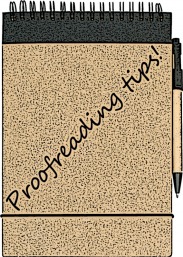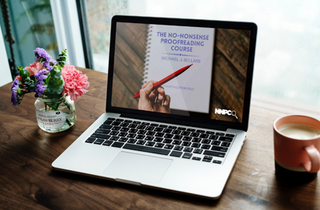|
In my experience, proof readers tend to be rather calm individuals, going about their work in an unruffled, dignified manner. Proof readers are rarely confrontational in temperament, because proofreading by its very nature requires a serene and reflective approach. So, it was rare for me, as an Operations Manager supervising, amongst other people, proof readers, to have to intervene in any kind of serious dispute.
Except when it came to hyphens. To a proof reader, hyphens are like a red rag to a bull. There appear to be two distinct camps. On the one hand you’ve got your proof readers who can’t get enough of hyphens, proof readers who would happily mark-up an otherwise clean proof with an overabundance of little red dashes. And, on the other hand, you’ve got your anti-hyphen proof readers (or should that be ‘antihyphen’ or ‘anti hyphen’?). These guys would gladly see the hyphen put it into storage, to be taken out and dusted off on those rare occasions where context alone is insufficient to infer meaning. My personal leanings are toward the second camp. There was nothing more infuriating than seeing a proof limp toward the finish line simply because of a few hyphens (particularly when it’s holding up an entire forme and the head of the print department is having a monumental hissy fit). Given my personal feelings on this matter, it’s probably best if I hand over to an independent authority: the Plain English Campaign. The following is from their excellent website: The main use of a hyphen is to join two or more words together. Sometimes a word needs a hyphen for it to be spelt correctly. For example: • one-off • part-time • face-to-face In some situations there are no hard and fast rules and the use of hyphens is a matter of personal preference. However, there are some guidelines on when you should use them. In compound adjectives (single adjectives formed from two or more words) that appear before a noun For example: • An up-to-date guide is a guide that is up to date. • Income-based Jobseeker’s Allowance is a benefit that is based on your income. • An energy-efficient fridge is one that is energy efficient. These hyphens are often necessary to avoid confusion. For example: • A blue-collared shirt is a shirt with a blue collar, while a blue collared shirt could be a blue shirt that has a collar. • A French-dictionary salesman is a man who sells French dictionaries, while a French dictionary salesman could be a Frenchman who sells dictionaries. • A red-wine bottle is a bottle for red wine, while a red wine bottle could be a wine bottle that is red. To distinguish one word from a similar one For example: • re-sort, not resort • co-op, not coop • re-form, not reform With prefixes Some words formed with a prefix are always hyphenated. For example: • self-employed • pro-family • anti-aircraft With some prefixes, a hyphen is not necessary but is preferable to help with pronunciation, avoid a double vowel, or stop a word looking odd. For example: • co-ordinate • re-enter • de-ice When numbers between 21 and 99 are written out in full For example: • twenty-one • ninety-nine • one hundred and thirty-four (Note that only ‘thirty-four’ is hyphenated.) Remember, us proof readers are a relatively small group. We need to stick together. So, let’s not fight.
4 Comments
Deane
3/9/2012 03:19:49 am
Just wanted to mention an alarming trend, hyphenating phrases ending with "year old" or "years old", even if they're not modifiers preceding their nouns. For example: "The editor was thirty-years-old." Makes me want to scream!
Reply
Seedubb
11/15/2012 04:10:43 pm
Your last sentence:
Reply
Michael
11/18/2012 02:37:20 am
Hi Seedubb,
Reply
Your comment will be posted after it is approved.
Leave a Reply. |
Details
Testimonials
“I am one of those many fools who paid a huge amount of money for a useless course. This book... has opened so many doors for me. I now look on Mike as my mentor as I embark on a career. Thank you Mike.” Emma Steel, Proofreader and International Structural Editor. “ I thoroughly enjoyed the course and am so glad that I decided to take it... the whole experience was invaluable. My proofreading service is now well established and your course played no small part in getting it off the ground.” Hache L. Jones, Proofreader. “I'd just like to thank you first of all for writing such a great, straight forward eBook, and then going above and beyond what I would even expect as a customer by providing us, completely free of charge, updated versions months later!” Rachel Gee, Trainee Proofreader. “What can I say? Worth every penny and then some! God Bless! This a fabulous course.” Teresa Richardson, Proofreader. “As someone who has effectively been proofreading for thirty years, I found Mike’s No-Nonsense Proofreading Course an invaluable introduction and a very useful practical guide to many aspects of this discipline. I can wholeheartedly recommend it as the ideal starting point, and much more besides.” Jeremy Meehan, Proofreader. Blog AuthorMy name's Mike Sellars and I'm an experienced proofreader and the author of The No-Nonsense Proofreading Course. Click here to find out more about me. The No-Nonsense Proofreading CourseA Fraction of the Cost of Other Proofreading Courses NOTE: Stock is currently limited to 10 per day, so we can continue to deliver exceptional after-sales service, answer queries and provide open-door support. Credit card and PayPal payments accepted. “As someone who has been proofreading for 30 years, I found Mike’s course an invaluable introduction and a very useful practical guide to many aspects of the discipline. I can wholeheartedly recommend it.” Jeremy Meehan, Proofreader. Still want to find out more? Click here. Proofreading Categories
All
Proofreading Archives
July 2024
|


 RSS Feed
RSS Feed
